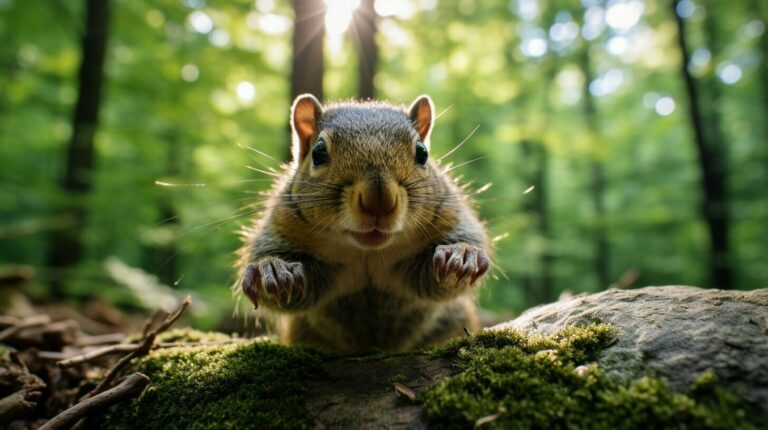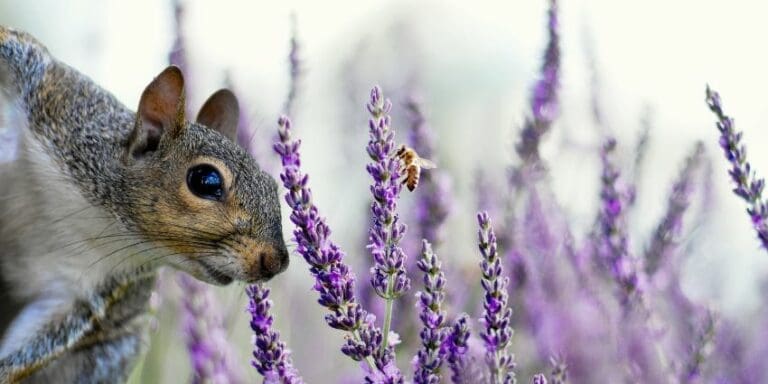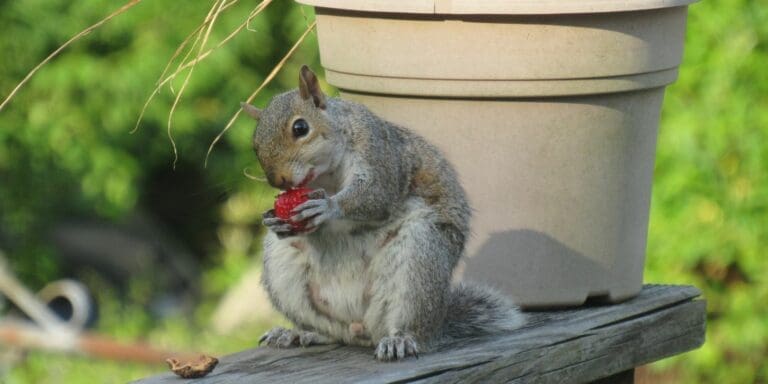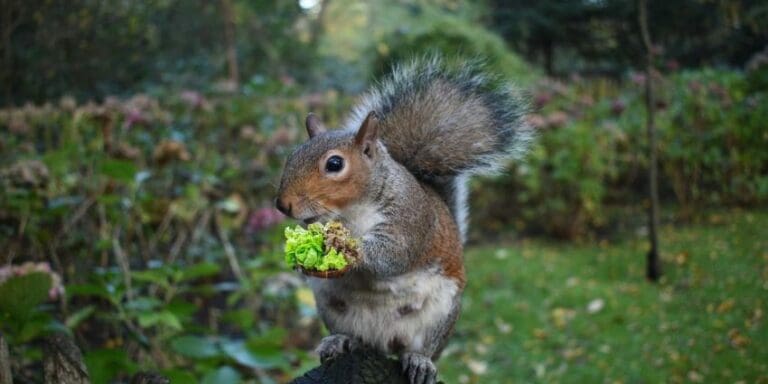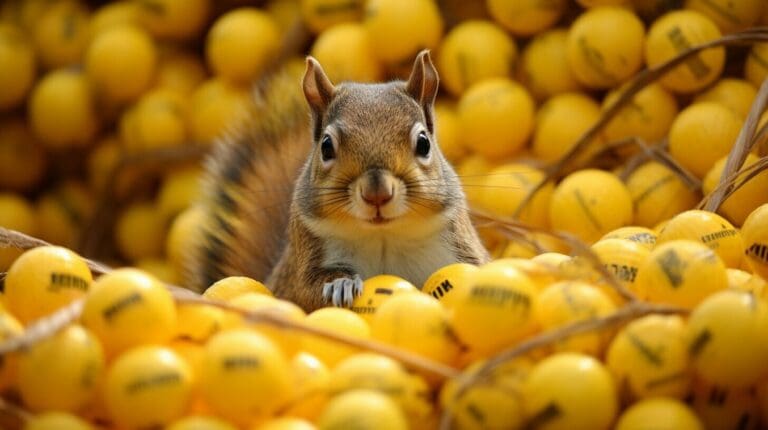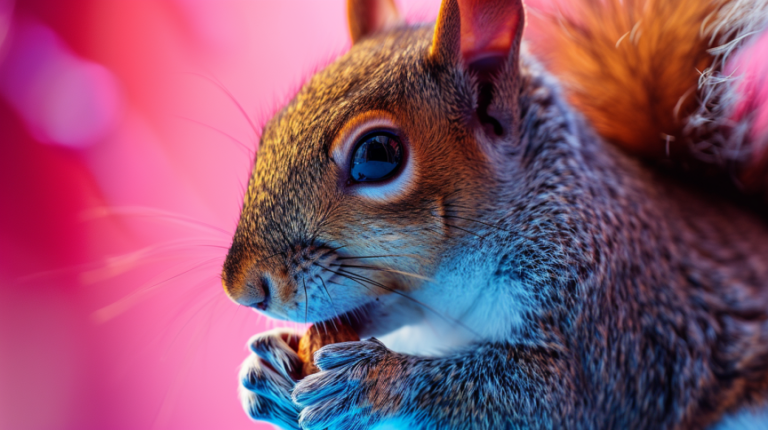Can Squirrels Eat Cheese? Discover the Nutty Truth.
Picture a squirrel in your garden, a tiny chunk of cheese clasped tightly in its tiny paws. A sight as surreal as a Disney movie setting, isn’t it? Well, brace yourself as we’re about to unravel the surprising truth behind one of nature’s quirkiest questions: can squirrels eat cheese?
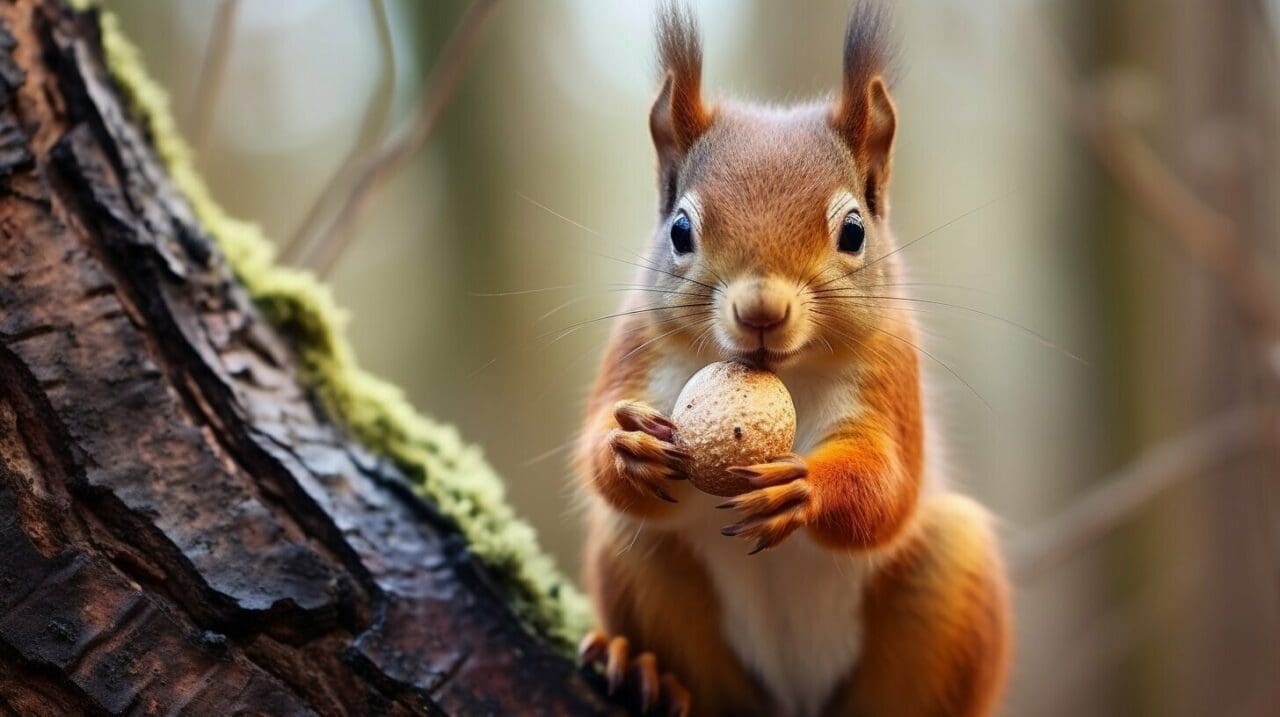
Tucked away in the everyday humdrum, we often overlook these little furry creatures and their dietary habits. Here you’ll discover the facts behind the cheese-consuming squirrel saga and a compelling mixture of zoological insights, one cheddar chunk at a time.
Can Squirrels Eat Cheese?
Squirrels can eat cheese, but it is not recommended as a regular part of their diet due to potential lactose intolerance and the high fat content which is not ideal for their nutritional needs.The Surprising Truth About Squirrels and Cheese
When we think about a squirrel’s diet, forest-based food items such as acorns, seeds, and small insects predominantly come to mind. However, a less known fact is that squirrels have a relatively varied diet that can include unsuspected foods like cheese. Here, we’re going to examine if these small rodents can digest cheese, and if they indeed bother eating it.
One thing to remember is that squirrels are opportunistic eaters, meaning they’re known to nibble on different types of foods available in their surroundings. However, their body’s ability to process certain food items, including cheese, is an entirely different scenario.
Heavy consumption of cheese is not considered healthy for squirrels. It’s mainly due to the high volume of fat and lactose present in cheese. And while squirrels have been known to eat cheese on occasion in urban environments, it’s typically not a part of their natural diet nor is it especially good for their digestive system.
The Scientific Dogma
A high volume of lactose can cause digestive distress in squirrels since, like many mammals, they become lactose intolerant as they grow older. And while squirrels might seem fine initially with consumption, in the long term, the lactose in cheese could potentially lead to gastrointestinal discomfort and other related ailments.
Likewise, cheese is a high fat food, which can lead to excessive weight gain and associated health issues in squirrels over time. This may include heart disease and diabetes, among other conditions.
Now, let’s look into how squirrels generally respond to the cheesy delicacies.
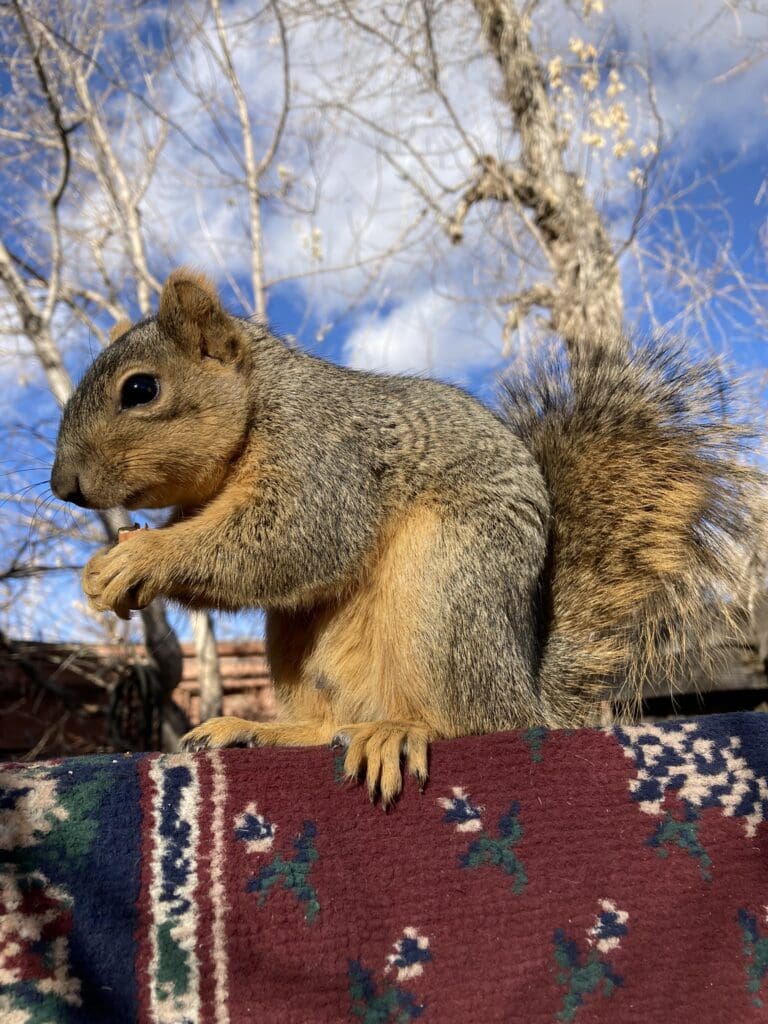
How Squirrels React to Cheese
Of course, each squirrel is different, but generally, their reaction to cheese can vary significantly.
Some squirrels might be enticed by the strong smell of cheese and can be seen nibbling on small pieces. However, a significant number find cheese unappealing, possibly due to its unfamiliar, potent scent compared to their typical diet of seeds, nuts, and berries.
Observational Studies
Observations and anecdotal evidence indicate that urban squirrels are more likely to taste cheese than their counterparts who live in more natural settings. This is probably because city-dwelling squirrels encounter more human food in their daily foraging.
In a nutshell, while squirrels can eat cheese and may occasionally do so when other foods are scarce, they should ideally stick to their natural, healthier diet. And while cheese might not immediately harm them, consuming it can pose potential health risks over the long term.
In the wild, it’s better to leave the feeding of squirrels to Mother Nature to ensure their dietary needs are adequately met and their natural behaviors are not negatively influenced by human interaction.
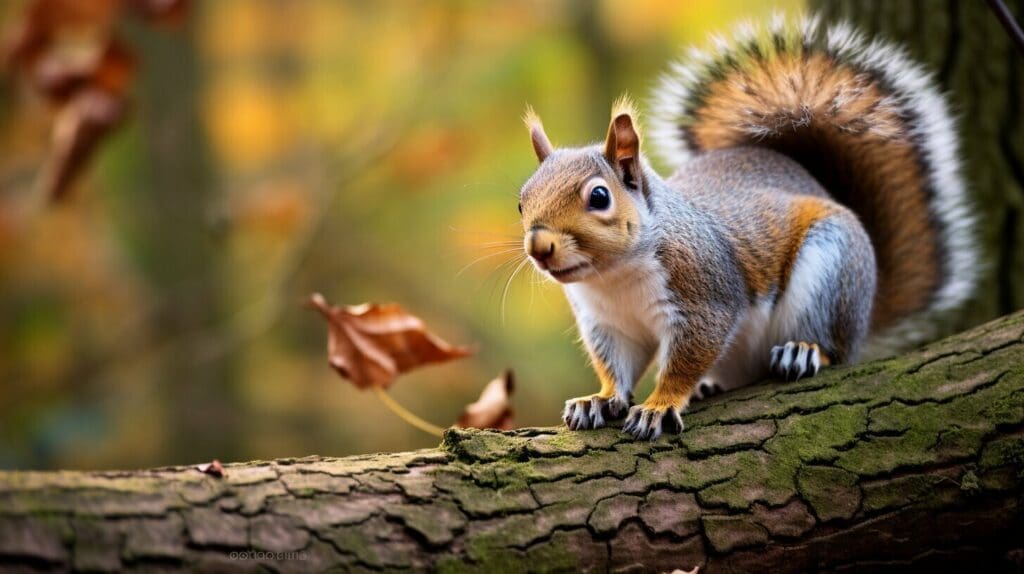
Understanding Squirrels’ Dietary Needs
- Discover what shape a squirrel’s natural diet takes in the wild.
- Gain a grasp of why some human foods, including cheese, may pose a hazard to these animals.
The Natural Diet of Squirrels
Squirrels are fundamentally omnivores. They thrive off a diet dense in nuts, seeds, fruits, and green vegetation; these make up the fundamental makeup of their dietary needs. Acorns, hazelnuts, walnuts, sunflower seeds, and pine nuts all make the prime list of their go-to munchies. In addition, berries and various plant shoots provide them with necessary nutrients and variety. MANUAL CHECK – consider adding a chart here to illustrate a squirrel’s diet breakdown.
For sustenance and to maintain their active lifestyle, squirrels also consume insects, small birds, and even their eggs. This diet has honed over millennia, equipping them with strong teeth and a keen appetite, making them efficient foragers. One fascinating aspect is the habit of burying their finds for future use, a delightful behavior known as ‘caching’. Essentially, they’re nature’s tiny doomsday preppers.
The variety in a squirrel’s diet is of crucial importance. Lack of a balanced diet can lead to severe nutritional deficiencies, affecting their overall health and longevity.
The Dangers of Human Foods for Squirrels
Millions of people are enthused by the playful nature of squirrels, often leading to feeding them in parks and backyard gardens. However, it’s essential to highlight that not all foods we love are safe for them, cheese included.
Many human foods contain ingredients and additives that are unfamiliar to the squirrel’s digestive system. For instance, cheese poses a significant risk due to its high lactose content. Squirrels lack the enzyme lactase, necessary to break down lactose, often resulting in adverse reactions and digestive distress. Additionally, cheese, like other processed foods, has high levels of sodium, posing potential health risks to these small creatures.
The caution isn’t just limited to cheese. Foods often thought to be harmless, such as bread or salty nuts, can equally pose risks to squirrel health due to their sugar or sodium content. Remember, even if squirrels accept these foods, it doesn’t mean they’re beneficial for them. This critical nuance forms an area we often overlook when interacting with our cute furry counterparts in the wild. ModelAndView with information like this in mind, it’s possible to ensure our interactions with squirrels don’t unintentionally harm them.
What Should Squirrels Eat Instead of Cheese?
- Exploring safe and healthy food options for squirrels
- Understanding the importance of a balanced diet for woodland creatures
- Providing nutritious sustenance for our furry friends
Safe and Healthy Alternatives to Cheese for Squirrels
Cheese, though appealing to many squirrels, isn’t an ideal snack for them. But fear not, plenty of safe and beneficial alternatives abound. Raw fruits and vegetables, especially those high in Vitamin C, are the way to go. Apples, oranges, broccoli, and spinach are in fact all suitable for a squirrel’s diet. Checking with a wildlife rehabber, one can find that whole raw nuts – such as acorns, almonds, and hazelnuts – are also safe for squirrels. Offering these in moderation can give our little friends a taste of their native diet.
| Healthy Foods | Explanation |
|---|---|
| Nuts | Almonds, walnuts, pecans; provide energy and essential fats. |
| Seeds | Sunflower seeds, pumpkin seeds; high in fat and protein. |
| Fruits | Apples, bananas, berries; high in vitamins and hydration. |
| Vegetables | Carrots, spinach, broccoli; rich in fiber and nutrients. |
| Mushrooms | Offer various nutrients; ensure they are safe and non-toxic. |
| Eggs | High-quality protein; cooked without oil or seasoning. |
| Sweet Potatoes | High in vitamins and fiber; serve in moderation. |
| Nuts in Shells | Hazelnuts, acorns, chestnuts; provide mental stimulation. |
| Corn | Provides energy; should be a small part of their diet. |
| Leafy Greens | Kale, lettuce, Swiss chard; rich in vitamins and fiber. |
While treating squirrels, ensure that foods are pesticide-free. To avoid potential choking, chop apples, and other larger fruits into bite-sized pieces. Fresh veggies like zucchini, bell peppers, and cucumber are also healthy options, delivering a nice crunch in addition to essential nutrients.
The Importance of a Balanced Diet for Squirrels
Just like us, squirrels too need a varied and balanced diet for optimal health. A proper diet goes beyond mere survival; it supports growth, reproduction, and agility that squirrels need for their busy lives scampering around the trees. It’s worth noting that a squirrel’s dietary needs change with season, age, and even geographic location.
Squirrels mostly require a high protein, low fat diet. The protein comes from nuts, seeds, and occasional insects, while tree bark and other vegetation provide fiber. Nuts and seeds, also supply healthy fats necessary for energy. However, intake of these should be controlled as excess can lead to obesity.
Natural foods, acquired right from their environment, best meet a squirrel’s nutritional needs. So, if well-intentioned and hoping to supplement their food sources, it’s best to stick as closely as possible to their natural diet, leaving out foods that are processed, salted, or flavored, like that tempting piece of cheese.
By prioritizing the health and well-being of our woodland friends, we can offer them a balanced diet that will not only keep them happy and active but also contribute positively to their overall ecosystem.
Note: Feeding squirrels, or any wild animal, should be done responsibly and as minimal as possible. Always consult with a local wildlife expert or rehabber before supplementing a wild animal’s diet.
- Discover what shape a squirrel’s natural diet takes in the wild.
- Gain a grasp of why some human foods, including cheese, may pose a hazard to these animals.
The Natural Diet of Squirrels
Squirrels are fundamentally omnivores. They thrive off a diet dense in nuts, seeds, fruits, and green vegetation; these make up the fundamental makeup of their dietary needs. Acorns, hazelnuts, walnuts, sunflower seeds, and pine nuts all make the prime list of their go-to munchies. In addition, berries and various plant shoots provide them with necessary nutrients and variety. MANUAL CHECK – consider adding a chart here to illustrate a squirrel’s diet breakdown.
For sustenance and to maintain their active lifestyle, squirrels also consume insects, small birds, and even their eggs. This diet has honed over millennia, equipping them with strong teeth and a keen appetite, making them efficient foragers. One fascinating aspect is the habit of burying their finds for future use, a delightful behavior known as ‘caching’. Essentially, they’re nature’s tiny doomsday preppers.
The variety in a squirrel’s diet is of crucial importance. Lack of a balanced diet can lead to severe nutritional deficiencies, affecting their overall health and longevity.
The Dangers of Human Foods for Squirrels
Millions of people are enthused by the playful nature of squirrels, often leading to feeding them in parks and backyard gardens. However, it’s essential to highlight that not all foods we love are safe for them, cheese included.
Many human foods contain ingredients and additives that are unfamiliar to the squirrel’s digestive system. For instance, cheese poses a significant risk due to its high lactose content. Squirrels lack the enzyme lactase, necessary to break down lactose, often resulting in adverse reactions and digestive distress. Additionally, cheese, like other processed foods, has high levels of sodium, posing potential health risks to these small creatures.
The caution isn’t just limited to cheese. Foods often thought to be harmless, such as bread or salty nuts, can equally pose risks to squirrel health due to their sugar or sodium content. Remember, even if squirrels accept these foods, it doesn’t mean they’re beneficial for them. This critical nuance forms an area we often overlook when interacting with our cute furry counterparts in the wild. ModelAndView with information like this in mind, it’s possible to ensure our interactions with squirrels don’t unintentionally harm them.
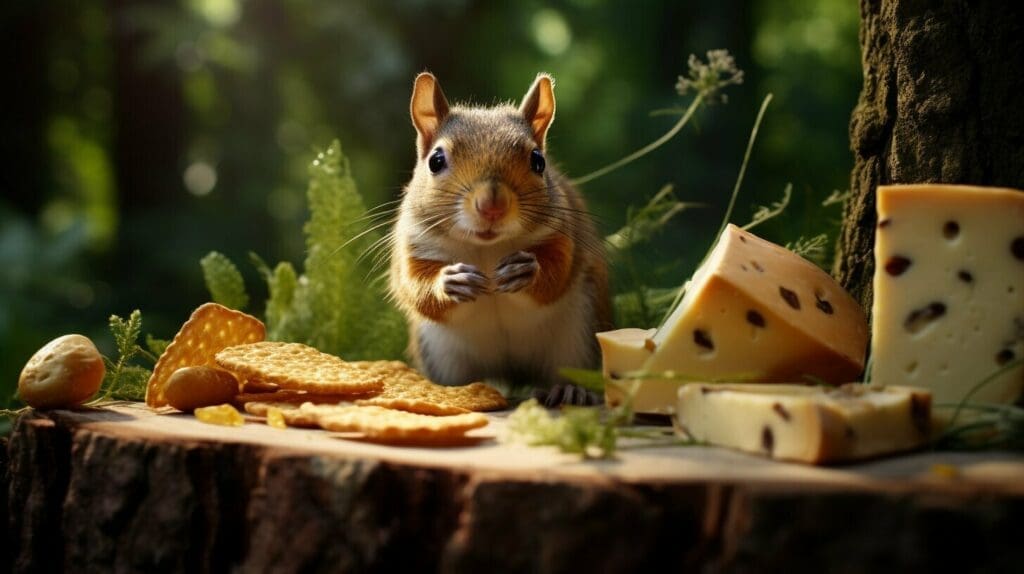
The Risks of Feeding Squirrels Cheese
- Potential health risks to squirrels linked to cheese consumption.
- Impact of cheese on squirrels’ natural behavior and survival instincts.
Moving on from understanding what forms the crux of the squirrel’s diet, it’s time to discuss a popular question: Can squirrels eat cheese and what happens if they do so?
Why Feeding Squirrels Cheese Can Be Harmful
As fascinating as it sounds to share a piece of your lunch with your bushy-tailed visitor, the exchange could be less than beneficial for the squirrel.
Cheese, for one, is not a natural part of a squirrel’s diet. While squirrels can consume and often enjoy an array of foods, including fruits, vegetables, nuts, and seeds, cheese, due to its dairy content, can prove less digestible for them. Over time, regular consumption of cheese or other dairy products may lead to adverse health effects, including digestive issues, poor nutrition, and potential weight gain.
Digestive Issues
Cheese is laden with lactose – a type of sugar found in dairy products. While humans and some animals produce an enzyme called lactase that helps digest lactose, squirrels lack this enzyme. Hence, a squirrel’s digestive system might struggle to process cheese leading to digestive discomfort, and in severe cases, diarrhea or other gastrointestinal issues.
Imbalances in Nutrition
Another concern regarding cheese is its high-fat content. Squirrels might find it hard to resist the rich, creamy taste of cheese, but its high-fat and low-fiber content are nowhere near their nutritional needs. An imbalanced diet could potentially lead to malnutrition and overall poor health.
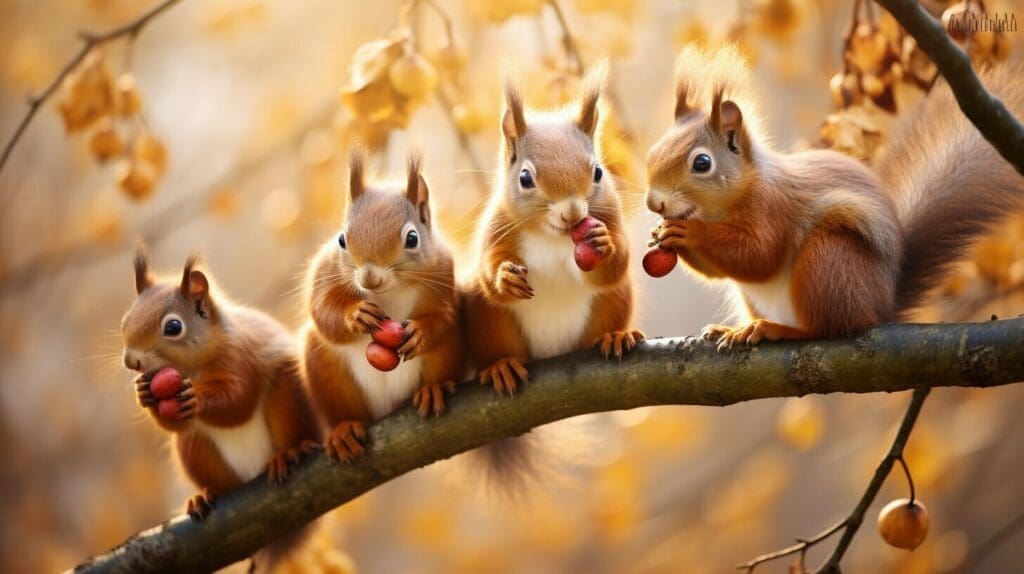
The Impact of Cheese on Squirrels’ Behavior
Yet, the risks extend beyond health. Feeding squirrels cheese or other human foods can drastically alter their natural behavior and affect their survival skills.
Dependency on Human Food
When squirrels get used to being fed by humans or coming across easy food sources such as cheese or breadcrumbs, they may become less inclined to hunt for their natural food sources. This can lead to a dependency on human foods and a decrease in their natural foraging behavior.
Alteration in Squirrels’ Natural Fear of Humans
Feeding squirrels may cause them to lose their natural fear of humans. Instead of fleeing at the sight of people, they might approach expecting food. This alters their survival instincts, exposes them to potential dangers, and might disrupt the ecological balance.
Keep in mind that while feeding squirrels might seem like an act of kindness, it could inadvertently lead to serious consequences. To truly care for these sprightly creatures, it’s better to leave them to their natural diet and wilderness survival instincts.
Alternatives to Cheese for Feeding Squirrels
- Safe squirrel foods are readily available in nature and possibly your own pantry.
- Strategies to feed squirrels without risking their health or upsetting the natural balance.
Safe Foods to Feed Squirrels
While much fascination surrounds what squirrels can eat, there are plenty of other food options if you feel compelled to extend a snack. Fruits, vegetables, and nuts are the optimal choices when feeding squirrels.
Apples, grapes, and bananas are fruits that are typically safe and enjoyed by these fluffy friends. Berries, cherries, and peaches are also adored by squirrels, but they should be offered in moderation due to the high sugar content.
When it comes to nuts, almonds, hazelnuts, peanuts, and walnuts are clear winners for these backyard dwellers. But remember, while they love munching on these treats, the shells should not be given as they pose a choking hazard.
Vegetables such as kale, spinach, and bell peppers are the secret to keeping squirrels healthy and happy. Also, raw pumpkin seeds, sunflower seeds, and mealworms are excellent sources of protein.
How to Safely Feed Squirrels
Feeding squirrels should always be done with consideration to the human-wildlife rules and regulations in your local area. Here are a few general pointers to keep in mind.
Firstly, never hand-feed squirrels. It’s unsafe, for you and the squirrel. Instead, use wildlife feeders placed at a safe height from the ground. This approach not just bypasses any risks of accidental bites but also keeps the food out of reach from other unwanted wildlife.
What quantity to feed is another overarching thought. Feeding should be inconsistent and unpredictable. A constant food source may result in overdependence, cause population imbalances, and attract unwanted pests.
While it’s quite charming to interact with squirrels, their feeding should provide nourishment without creating dependencies or causing imbalances in their natural foraging habits.
Conclusion
Our fluffy friends’ take on cheese is clear now: while squirrels can, occasionally, nibble on cheese without severe consequences, it shouldn’t make up their daily diet due to the high amounts of fats and lack of nutrients essential for their health.
Understanding your furry friend’s dietary needs can save you from unnecessary vet bills and heartache. Now, the only logical step is to implement this knowledge! When feeding wild squirrels or your pet, opt for natural nuts, fruits, and veggies instead of commercial, sometimes misguiding, snacks.
Curious about other surprising foods squirrels can or can’t eat? Perhaps it’s time to research ‘Can squirrels eat chocolate?’ or ‘Are nuts healthy for squirrels?’ You’re not just feeding squirrels; you’re becoming a squirrel-food connoisseur!
Remember: fostering a healthy relationship with nature starts by understanding how tiny choices impact an entire ecosystem. It’s worth considering, isn’t it? By choosing to feed squirrels correctly, you take a small but significant step towards harmonious wildlife coexistence. With newfound knowledge comes newfound responsibility. Apply it wisely and continue your journey to becoming a more nature-conscious individual!
Because, when the squirrels are happy, aren’t we all a bit happier?
FAQ
Can squirrels eat cheese?
While squirrels are omnivores and may occasionally nibble on cheese if available, it is not a natural part of their diet and should not be a regular food source for them.
Do squirrels eat cheese?
Squirrels primarily eat nuts, seeds, fruits, and vegetables as part of their natural diet. Cheese is not a typical food choice for squirrels.
Is cheese safe for squirrels?
Feeding cheese to squirrels can pose potential risks and digestive issues. It is best to stick to their natural diet to ensure their overall health and well-being.
What happens if squirrels eat cheese?
Consuming cheese can lead to negative health consequences for squirrels, including digestive problems, reduced appetite for their natural food sources, and potential weight gain.
